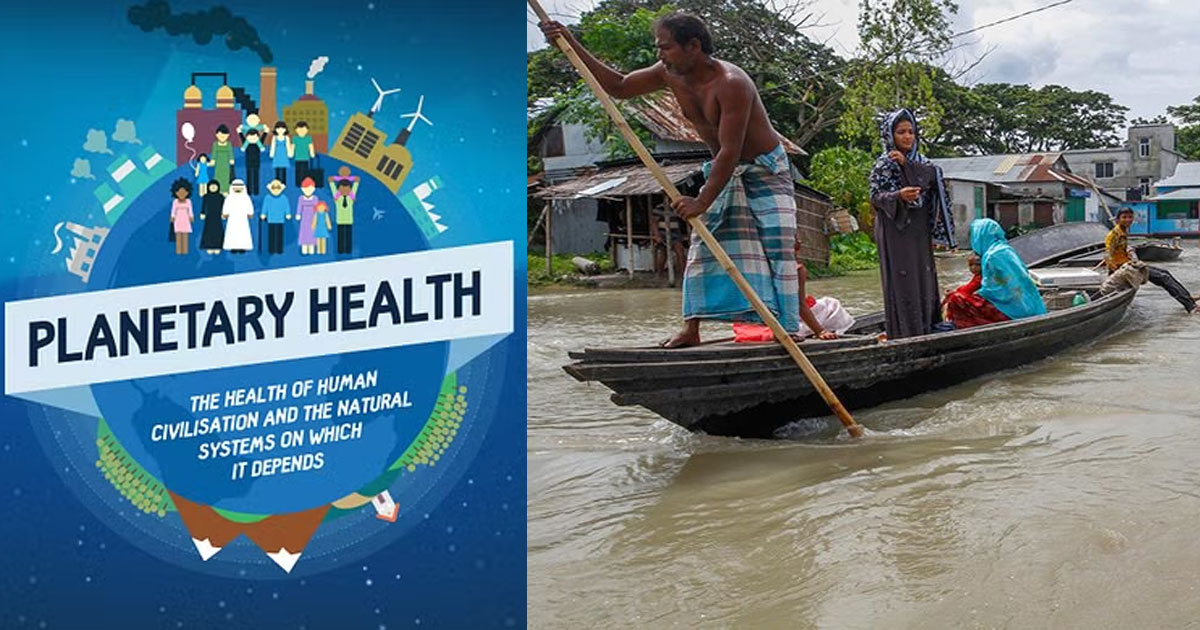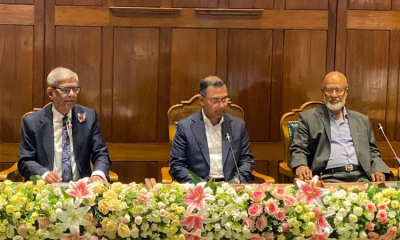Bangladesh faces critical challenges and opportunities as global environmental crises intensify. Research from the Earth Commission in The Lancet Planetary Health highlights severe threats from climate change, biodiversity loss, and water scarcity, putting millions at risk. Despite contributing little to global emissions, Bangladesh bears a heavy burden. However, through equitable resource management and sustainable practices, the country has the potential for transformative growth amid the global environmental crisis.
Neighboring countries like India face similar environmental challenges, highlighting global inequality in resource management. New research in The Lancet Planetary Health, led by Professors Joyeeta Gupta, Xuemei Bai, and Diana Liverman, warns that without urgent transformation of economic systems and fairer resource use, the planet will struggle to support even a basic standard of living by 2050. Building on the Safe and Just Earth System Boundaries, the study finds that climate and other vital systems are approaching dangerous tipping points, threatening global well-being unless energy, food, and urban systems are drastically reformed.
The research reveals that global inequality and overconsumption by a minority are key drivers of environmental decline. Vulnerable communities, especially those in poverty, are most affected by climate change, biodiversity loss, pollution, and water scarcity. However, the findings stress that even the wealthy are ultimately at risk.
The Risks: Bangladesh at the Forefront
· Sea-Level Rise and Climate Change: Immediate Threats to Millions
With its low-lying geography, Bangladesh is highly vulnerable to rising sea levels. Projections estimate that a 2°C rise in global temperatures by 2100 will directly expose 30 million Bangladeshis to the threat of sea-level rise, displacing communities and disrupting agriculture, a key economic sector. Coastal regions, already battling salinity intrusion, will face increasingly frequent and severe extreme weather events, with devastating social and economic consequences.
· Biodiversity Loss: Affects Over 38 Million People
The degradation of ecosystems in Bangladesh has put 38 million people in danger of losing vital ecosystem services such as water purification and fertile soil, further threatening food security and public health. This mirrors challenges in India, where 1 billion people are affected by ecosystem service degradation, reflecting a regional crisis in biodiversity loss. The erosion of natural habitats, particularly in rural areas, poses significant risks to livelihoods and exacerbates poverty.
· Pollution and Public Health: A Growing Crisis
Approximately 158 million Bangladeshis are exposed to unsafe levels of air pollution, particularly fine particulate matter (PM2.5), which contributes to respiratory and cardiovascular diseases. Without intervention, pollution levels will continue to strain the country`s healthcare system and economy. Additionally, 5 million and 131 million people face exposure to unsafe levels of nitrogen and phosphorus, primarily from agricultural runoff and industrial waste. This nutrient surplus is degrading water quality and increasing the risk of food insecurity.
· Water Scarcity: A Ticking Time Bomb
With 51 million people at risk due to altered blue water flows, Bangladesh faces one of the most severe water scarcity challenges in the region. Unsustainable agricultural and industrial water use, compounded by climate change, threatens to deplete surface water resources, increasing vulnerability to floods and waterborne diseases. As population growth continues, the demand for water will intensify, putting additional pressure on already fragile ecosystems.
The Path Forward: Solutions for a Sustainable Bangladesh
Experts from the Earth Commission and various sectors advocate for urgent transformations in Bangladesh to build resilience and mitigate these risks. Three key strategies include:
1. Equitable Resource Management
Addressing inequality in access to vital resources like water and arable land is crucial. Bangladesh must prioritize vulnerable communities by investing in social programs and ensuring that economic development is inclusive, benefiting all citizens.
2. Investment in Sustainable Technologies
Innovations in renewable energy, agriculture, and water management are vital for reducing the country’s environmental footprint. Adopting these technologies will not only curb pollution and resource depletion but also stimulate economic growth by creating green jobs and attracting climate finance.
3. Collaborative Action Across Sectors
The report emphasizes the importance of cooperation between policymakers, businesses, and civil society. Bangladesh’s industries, particularly in agriculture and textiles, must adopt sustainable practices to mitigate their environmental impact. Urban centers can lead by implementing green infrastructure and reducing pollution.
Joyeeta Gupta, Professor at the University of Amsterdam and co-chair of the Earth Commission, warns, "The longer we delay addressing environmental inequality, the more extreme the consequences for all. Our systems are on the verge of collapse, and action must be taken now."
The fate of Bangladesh, India, and the broader South Asian region depends on collective global action. As Prof. Johan Rockström, co-chair of the Earth Commission, points out, “The safety of the planet and people is intertwined. Justice must be at the heart of our response to the planetary crisis. We have a window to act now and change course.”
With millions of lives and livelihoods at risk, Bangladesh’s future depends on how quickly both local and global leaders can respond to the growing environmental crisis. It’s a fight for survival—and one that requires bold, immediate action.












-20260217073221.webp)




-20260216115008.webp)





















